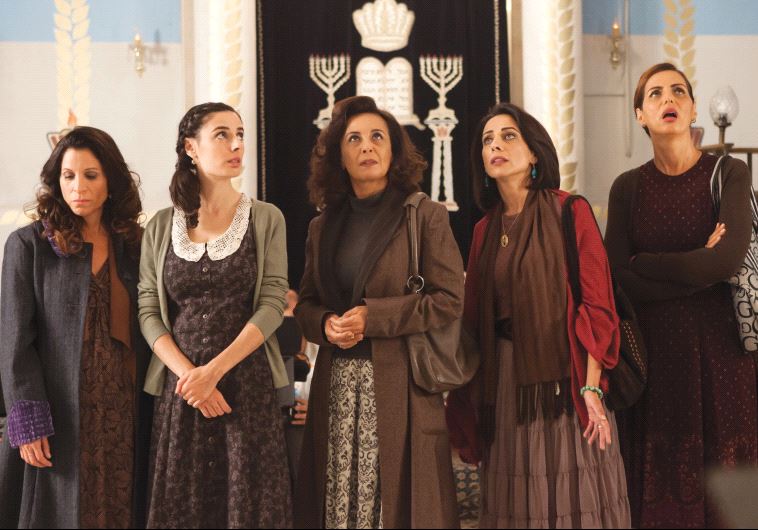By Dennis Hartley
(Originally posted on Digby’s Hullabaloo on November 4, 2017)

In his 2009 Guardian piece “Does Judaism discriminate against women?” Dan Rickman writes:
There is however, a deep conflict between Judaism and feminism which stretches from the public (in synagogue) to the private. For example, in all Orthodox synagogues men pray separately from women and in many women are relegated to an upstairs gallery. Gender hierarchies are entrenched in Jewish thought: a blessing orthodox Jewish men are required to say everyday thanks a God “who has not made me a woman”. […]
There are many couples where the husband is involved and the woman is estranged. What drives this is the dissonance between women’s lives in society at large where, at least in principle, all options are open to them, and their role in traditional Jewish life which is limited and constrained by laws developed by (male) rabbis.
Oy. So that begs an obvious question: Can you really be an Orthodox Jew and a feminist? Funnily enough, that is the name of a 2014 Telegraph article by Emma Barnett (an Orthodox Jew by upbringing and a feminist), who writes:
You see as a fully paid up feminist, I demand and expect total equality in my secular life and yet some would view what I accept as normal in my religious Jewish world, as anything but equal. Although believe me, no women in my personal Jewish life feel oppressed; if anything, they are in total control. […]
In the secular world, common sense must be the order of the day. It isn’t reasonable not to have women occupying the same roles as men and vice versa. But in a religious sphere, where faith is the binding force of a group of people, rationale has less sway or place. If you started applying logic to the beliefs held in most faiths, things would start to fall apart pretty quickly at the seams. […]
Male-led religions present a big dilemma to feminists in the modern world. And yes, on this topic, I am a full fat hypocrite. But as they say, faith begins often where logic ends.
This dilemma lies at the heart of a warm, witty and wise new Israeli dramedy called The Women’s Balcony, from director Emil Ben-Shimon and screenwriter Shlomit Nehama.
The story is set in present-day Jerusalem, in the predominately orthodox Bukharan Quarter neighborhood. As the film opens, a small but lively and close-knit congregation, led by venerable Rabbi Menashe (Abraham Celektar) gather at their modest synagogue for a bar-mitzvah.
Unfortunately, what begins as a joyous celebration takes a dark turn when the “women’s balcony” collapses mid-ceremony. Luckily, all survive, but sadly, the rabbi’s wife sustains serious injuries that require indefinite round-the-clock hospital care. The aging Rabbi Menashe, not in the best health himself, has a nervous breakdown.
This leaves the congregation with two major deficits; no place to worship until repairs can be facilitated, and no spiritual leader at the helm until the rabbi (hopefully) recovers from his debilitating mental trauma. A few days after the accident, several of the men from the congregation are discussing the future of the synagogue and decide to pray on it.
However, they realize that they are a few bodies short of a minyan (a quorum of 10), which they will need in order to conduct a service. They ask a young man who passes by.
As fate would have it, he happens to be a rabbi, who is more than happy to fetch some of his students and shore up the minyan. The men instantly take to the charismatic Rabbi David (Aviv Alush), who quite quickly ingratiates himself as the “temporary” head of their synagogue. A little too quickly, perhaps, for the women of the congregation, who are chagrined to learn that the hastily remodeled synagogue eschews the open balcony model for a stuffy glorified walk-in closet where they’re now relegated to sit for services.
The more the charming but duplicitous Rabbi David’s ultra-orthodox slip begins to show, the less enthralled are the women, who eventually find themselves reluctantly engaged in virtual guerilla warfare against this fundamentalist redux of their previously progressive synagogue. Still, they must step lightly; with marriages and long-time friendships on the rocks (much less the future of their once harmonious congregation) there’s much at stake.
This formidable coterie of strong female characters are well-served by their real-life counterparts (Israeli comedian Orna Banai, in her first major screen role; popular Israeli singer Einat Sarouf, making her film debut; acclaimed Moroccan-born actress Evelin Hagoel; actress-comedian Yafit Asulin) who deliver a wonderful ensemble performance.
How this extended family resolves their fractious row is relayed with compassion and astute observation, steeped in what I once described in a review as “…a rich tradition of comedic expression borne exclusively from a congenital persecution complex and cultural fatalism (trust me on this-I was raised by a Jewish mother).” That said (if I may re-appropriate a classic advertising slogan) “You don’t have to be Jewish to love Levy’s real Jewish rye” or in this case, to love Ben-Shimon and Nehama’s real Jewish wryness.








